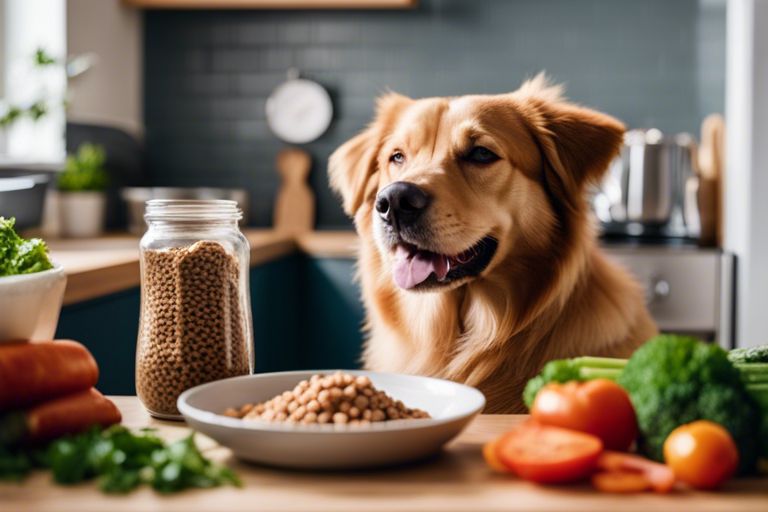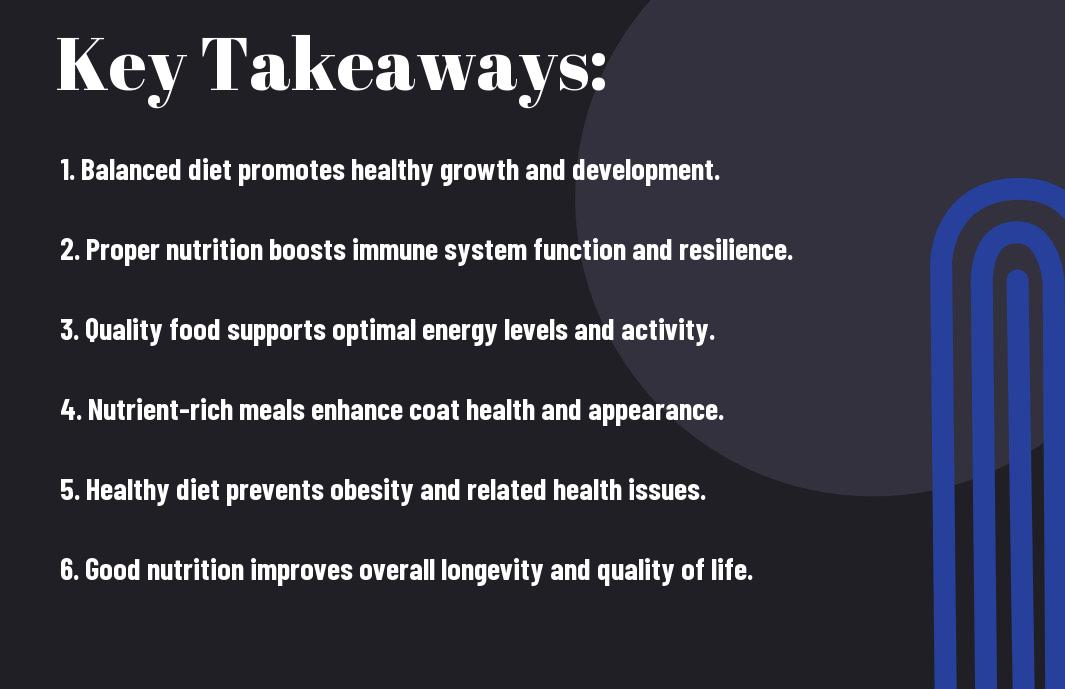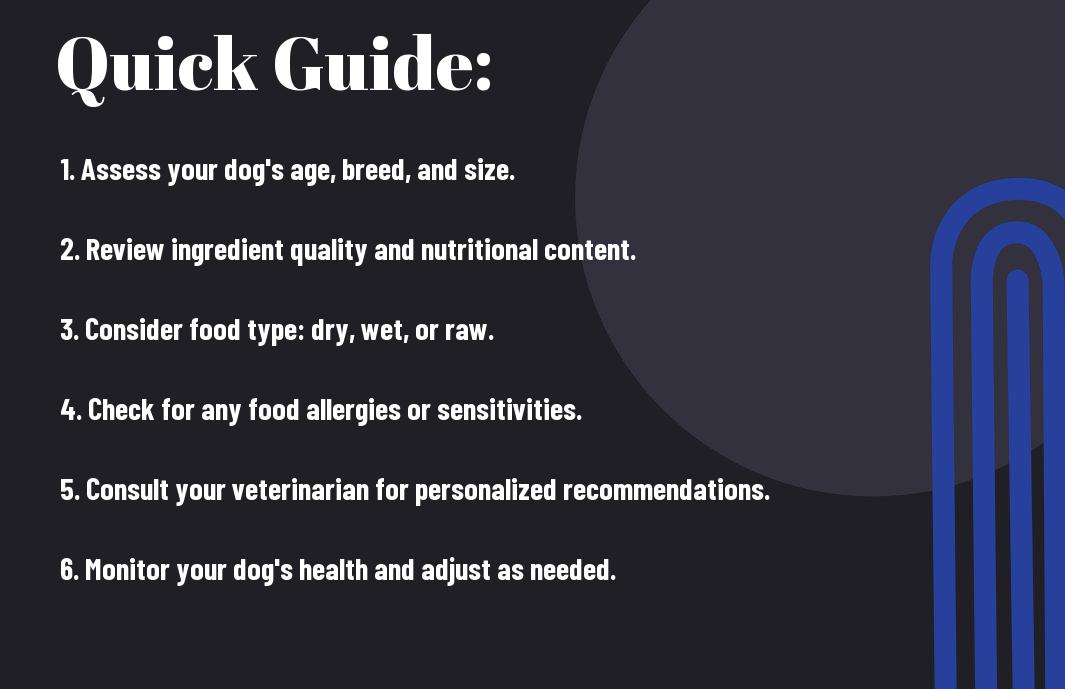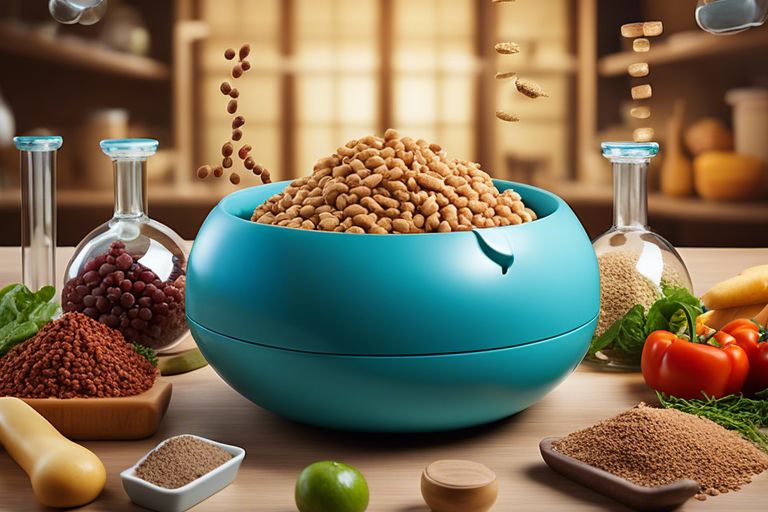Eudaimonia for your furry companions can be achieved through a holistic approach to their nutrition. While commercial pet food may provide convenience, it often lacks the essential nutrients and quality ingredients necessary for optimal health. Homemade pet food, on the other hand, offers a multitude of benefits that can enhance the overall well-being of your pets.
By taking a holistic approach to pet nutrition, you can ensure that your pets are receiving the best quality food that is tailored to their specific needs. In this blog post, we will delve into the numerous benefits of homemade pet food, including improved digestion, healthier skin and coat, and increased energy levels. We will also explore the importance of using organic and locally sourced ingredients, as well as the potential cost savings of preparing your pet’s food at home. Unlock the secrets of homemade pet food and give your furry friends the gift of optimal health and vitality.
Key Takeaways:
- Health Benefits: Homemade pet food provides better nutrition, fewer allergens, and improved digestion for pets.
- Control Over Ingredients: Pet owners have full control over the quality and type of ingredients used in homemade pet food, avoiding fillers and additives found in commercial pet food.
- Customization: Tailoring meals to a pet’s specific dietary needs and preferences is easier when making homemade pet food.
- Cost-Effective: Making pet food at home can be more affordable in the long run, especially for those with multiple pets or special dietary requirements.
- Quality Assurance: With homemade pet food, pet owners can ensure the quality and freshness of ingredients, reducing the risk of contamination or spoilage.
- Environmental Impact: Using locally sourced and sustainable ingredients for homemade pet food can have a more positive impact on the environment compared to commercial pet food production.
- Bonding Experience: Preparing homemade pet food can strengthen the bond between pet and owner, as it involves time, effort, and care for the pet’s well-being.
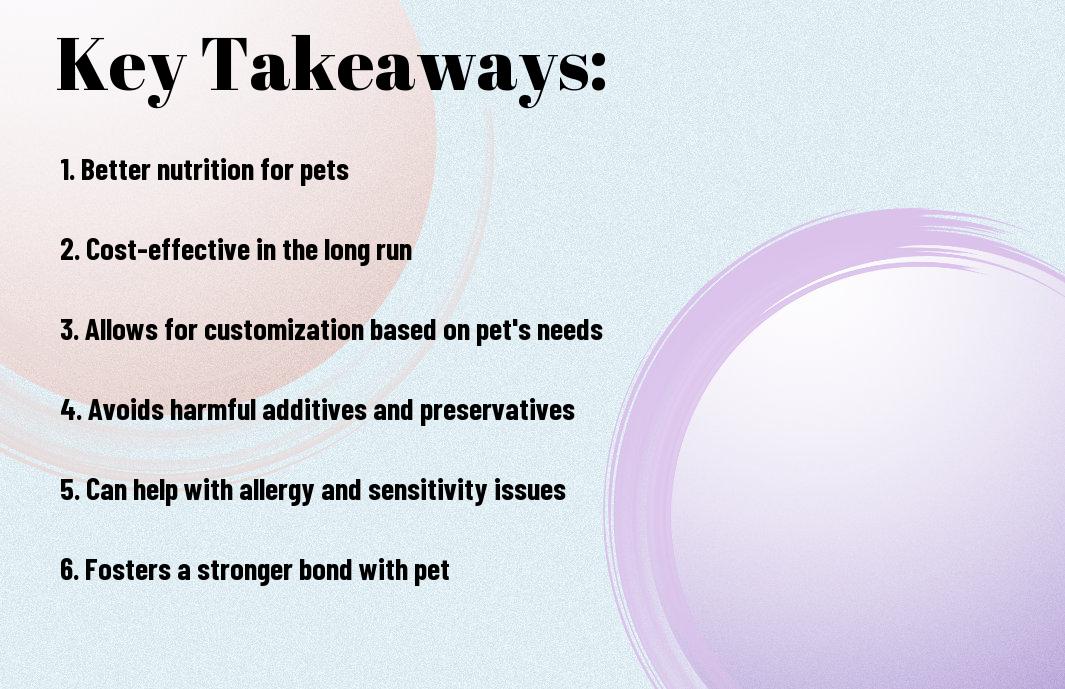
The Nutritional Advantages of Homemade Pet Food
Assuming the quality of ingredients used is high, homemade pet food offers several nutritional advantages over commercial pet food. It allows pet owners to have complete control over what goes into their pet’s diet, ensuring that it meets their individual nutritional needs. Homemade pet food can also provide a fresh and natural source of nutrients, as well as the option to cater to specific dietary requirements.
Tailored Nutrition for Individual Pets
To ensure optimal health and wellbeing, it’s important to tailor your pet’s diet to their individual needs. Homemade pet food allows you to customize meals based on your pet’s age, weight, activity level, and any special dietary considerations. This personalized approach can address specific health concerns and promote overall vitality and longevity in your pet.
The Importance of Fresh, Whole Ingredients
Homemade pet food offers the advantage of using fresh, whole ingredients that are free from artificial additives and preservatives. This ensures that your pet is receiving a diet that is not only nutritionally balanced, but also easily digestible and full of natural flavor. Fresh, whole ingredients can provide essential nutrients, vitamins, and minerals that contribute to your pet’s overall health and wellbeing.
Nutrition is a key component in maintaining your pet’s health, and feeding them fresh, whole ingredients can support their immune system, promote healthy digestion, and contribute to a shiny coat and strong teeth. By incorporating ingredients such as lean meats, fresh vegetables, and wholesome grains, you can provide your pet with a diet that is both delicious and nutritious.
Understanding Your Pet’s Dietary Needs
Unlike humans, animals have specific dietary requirements that need to be carefully considered when preparing their food. Understanding your pet’s dietary needs is essential for providing them with a balanced and nutritious diet that promotes their overall health and wellbeing.
Deciphering Pet Nutrition: Macronutrients and Micronutrients
Any well-balanced diet for pets should include the right balance of macronutrients such as proteins, carbohydrates, and fats, as well as essential micronutrients like vitamins and minerals. Proteins are crucial for muscle development and repair, while carbohydrates offer a source of energy. Fats are necessary for maintaining healthy skin and coat. Micronutrients play a vital role in supporting various physiological functions and should be included in the right amounts to prevent deficiencies or imbalances.
Life Stage Nutrition: Puppies/Kittens to Seniors
Pets have different nutritional needs at various stages of their lives, from being a playful puppy or kitten to becoming a senior companion. It’s essential to adjust their diet to their specific life stage to ensure they receive the appropriate levels of nutrients for growth, activity, and aging. Providing the right nutrition at each stage of life can help support their overall health and quality of life.
To ensure your pet receives the best possible nutrition, it’s important to understand their dietary needs at each life stage, including the right balance of macronutrients and micronutrients. By tailoring their diet to their specific requirements, you can help promote their overall health and wellness throughout their life.
Crafting Balanced Homemade Pet Food Recipes
Now that you’ve taken the first step in embracing a holistic approach to your pet’s nutrition by choosing to make their food at home, it’s important to ensure that the recipes you craft are balanced and complete. This means providing your pet with the right combination of protein, carbohydrates, fats, vitamins, and minerals that cater to their specific dietary needs.
The Basics of Menu Planning for Your Pet
Recipes for homemade pet food should be carefully planned to meet your pet’s nutritional requirements. This involves understanding the protein needs of your pet, whether they are a carnivore, omnivore, or herbivore, and choosing the appropriate sources for their protein intake. Additionally, you’ll need to consider the right balance of carbohydrates and healthy fats to ensure your pet’s energy needs are met. Consulting with a veterinarian or animal nutritionist can help you create a menu plan that caters to your pet’s individual needs.
Supplements and Superfoods: What to Include and Avoid
To complement the homemade food recipes for your pet, it’s important to include the right supplements and superfoods that can enhance their overall health and well-being. This may include essential vitamins and minerals, omega-3 fatty acids, and antioxidants. However, it’s equally important to be aware of the supplements and superfoods that can be harmful to your pet, such as certain herbs, spices, and additives. A consultation with a professional can help you navigate the dos and don’ts in this area.
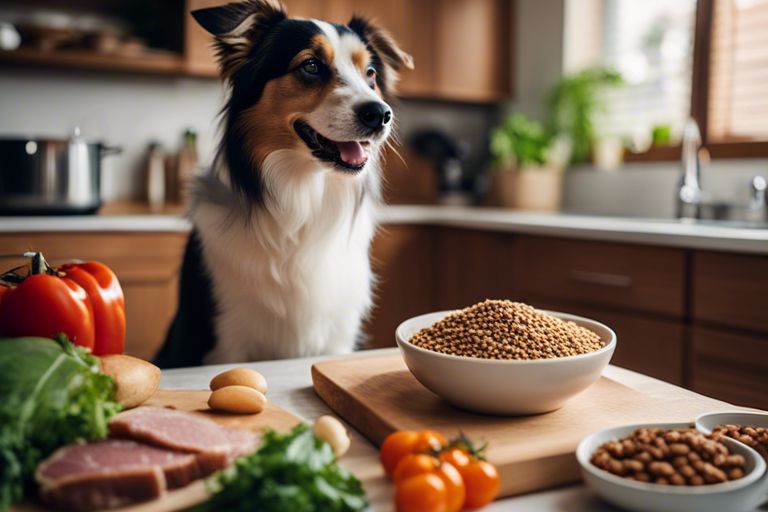
The Pros and Cons of Raw vs. Cooked Diets
Keep Importantly, when considering homemade pet food, it’s essential to weigh the pros and cons of raw and cooked diets. Below is a breakdown of the advantages and disadvantages of both options:
| Raw Diet | Cooked Diet |
| Pros: Natural enzymes and nutrients retained | Pros: Improved digestibility and food safety |
| Cons: Risk of bacterial contamination | Cons: Loss of some heat-sensitive nutrients |
| Pros: Potential for healthier skin and coat | Pros: Easier storage and longer shelf life |
| Cons: Potential for unbalanced nutrition without careful planning | Cons: Potential for the formation of harmful compounds during cooking |
| Pros: May help with weight management and digestion | Pros: Increased palatability for picky eaters |
The Raw Food Debate: Benefits and Risks
Debate over the benefits and risks of raw pet food continues in the veterinary and pet nutrition communities. Proponents argue that raw diets can provide essential enzymes and nutrients that are lost during cooking, leading to improved digestion and overall health. However, detractors raise concerns about the risk of bacterial contamination and the potential for unbalanced nutrition without careful planning.
Cooking for Your Pet: Safety and Nutrient Retention
Food safety and nutrient retention are crucial factors to consider when cooking for your pet. Proper cooking methods can help eliminate harmful bacteria and ensure that essential nutrients are preserved in the food. However, the cooking process can also lead to the loss of some heat-sensitive nutrients and the formation of potentially harmful compounds. It’s important to find a balance between food safety and nutrient retention when preparing homemade meals for your pets.
Benefits of cooking for your pet include improved food safety, nutrient retention, and palatability for picky eaters. However, it’s essential to be mindful of potential nutrient loss and harmful compound formation during the cooking process.
Common Homemade Pet Food Myths Debunked
Not all homemade pet food is created equal, and there are several myths surrounding it that need to be debunked. One common misconception is that homemade pet food is not nutritionally adequate for pets. However, with the right guidance and understanding of your pet’s nutritional needs, homemade pet food can provide all the necessary nutrients for a balanced diet. In fact, studies have shown that a properly formulated homemade diet can be just as nutritious, if not more so, than commercial pet food. For more information on this topic, check out Unlocking The Canine Ancestral Diet – Healthier Dog Food ….
Making Sense of Grain-Free and Allergy Considerations
Common myths surrounding homemade pet food often involve grain-free and allergy considerations. Many people believe that grain-free diets are always the healthiest option for pets, but this is not necessarily true. It’s important to understand that some pets may have allergies to certain grains, but not all grains are bad for them. Likewise, homemade pet food can be tailored to address specific allergy considerations, allowing pet owners to have better control over their pet’s nutrition.
The Truth About Homemade Food and Pet Health
Debunked myths surrounding homemade pet food often relate to its impact on pet health. It is commonly believed that commercial pet food is always safer and better for pets, but this is not necessarily true. In fact, several commercial pet food recalls have raised concerns about the safety of such products. Homemade pet food, when properly prepared, can actually reduce the risk of exposure to harmful additives and contaminants found in some commercial pet foods. It can also be more easily tailored to address specific health concerns, such as weight management or digestive issues.
It is important to dispel these myths and educate pet owners about the potential benefits of homemade pet food, including improved nutrition, reduced risk of exposure to harmful additives, and greater control over addressing specific health concerns such as food allergies or weight management.
Implementation and Transition Strategies
How to Transition Your Pet to a Homemade Diet Safely
To ensure a smooth transition to a homemade diet for your pet, it is crucial to do so gradually. Start by mixing small amounts of the homemade food with their current diet, gradually increasing the proportion of homemade food over the course of a few weeks. This will allow your pet’s digestive system to adjust to the new diet and minimize the risk of gastrointestinal upset. Additionally, consulting with a veterinarian or a pet nutritionist can provide personalized guidance and ensure that your pet’s nutritional needs are being met during the transition.
Shopping, Preparation, and Storage Tips for Homemade Pet Food
When preparing homemade pet food, it is important to source high-quality ingredients that are suitable for your pet’s specific dietary needs. Look for fresh, organic produce, lean protein sources, and healthy fats to provide a well-balanced meal. It is also crucial to follow safe food handling practices to minimize the risk of contamination. When it comes to storage, divide the portions into individual servings and store them in airtight containers in the refrigerator or freezer to maintain freshness and prevent spoilage. The proper storage of homemade pet food is essential to ensure the safety and nutritional value of the meals.
- Shop for fresh, organic produce and lean protein sources
- Follow safe food handling practices
- Store portions in airtight containers and refrigerate or freeze
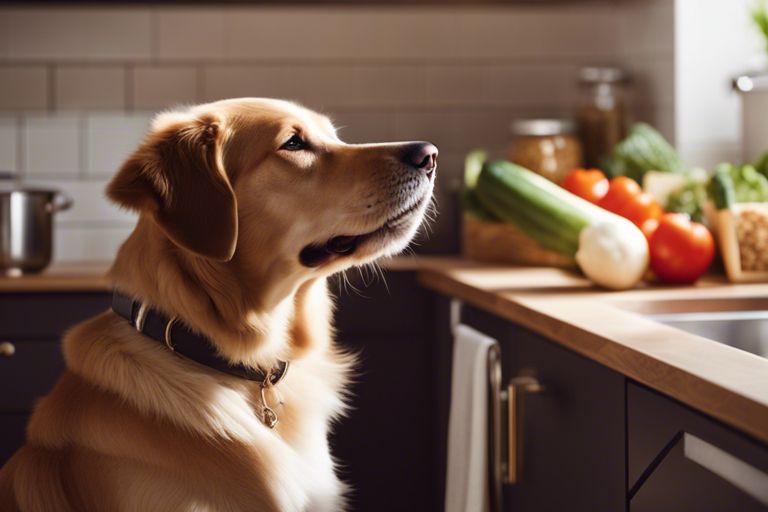
Monitoring Your Pet’s Health and Well-Being
For pet owners who have transitioned to homemade pet food, monitoring their pet’s health and well-being becomes an essential part of their routine. It is important to stay vigilant and observant of any changes in your pet’s behavior, physical appearance, and overall well-being. This chapter will discuss how to effectively monitor your pet’s health and what steps to take when concerns arise.
Assessing Your Pet’s Health: What to Look For
With the switch to homemade pet food, it is crucial to keep a close eye on your pet’s health. Look for signs of energy level, coat condition, skin health, and digestion. Changes in appetite, weight, and bathroom habits are also important indicators of your pet’s overall health. Additionally, monitor for any signs of discomfort, such as limping or excessive scratching. Regular veterinary check-ups are also crucial to ensure that your pet’s health is in optimal condition.
When to Consult a Veterinarian or Pet Nutritionist
Pets may require professional medical attention or nutritional guidance if there are any concerns about their health or well-being. If you notice persistent changes in behavior, appetite, or physical appearance, it is important to consult with a veterinarian or a pet nutritionist. These professionals can provide valuable insight and recommendations tailored to your pet’s specific needs. It’s important to seek professional advice if you are uncertain about any aspect of your pet’s health, as early intervention is key in maintaining their well-being.
Veterinarian and pet nutritionist consultations are essential to address any underlying health issues or to ensure that your homemade pet food diet is meeting all of your pet’s nutritional requirements. These professionals can provide personalized guidance and recommendations, as well as address any concerns about your pet’s health and well-being. Don’t hesitate to seek their expertise to ensure that your pet’s holistic health is being properly maintained.

Unlocking The Benefits Of Homemade Pet Food – A Holistic Approach
Hence, it is evident that homemade pet food offers numerous benefits for pet owners who are seeking a holistic approach to their pets’ nutrition. The ability to directly control the ingredients and avoid harmful additives, as well as cater to specific dietary needs, can lead to improved health and well-being for our beloved pets. In addition, the bond between pet and owner can be strengthened through the act of preparing and sharing homemade meals. For comprehensive guidance and recipes for homemade dog food, check out Homemade Dog Food by Jennifer Elkin (Ebook) – Everand at Everand.
FAQ
Q: Why should I consider homemade pet food?
A: Homemade pet food allows you to have more control over the ingredients, ensuring that your pet receives a balanced and nutritious diet free from fillers and preservatives.
Q: What are the key benefits of homemade pet food?
A: The key benefits include customized nutrition, fewer additives, improved digestion, and potential cost savings in the long run.
Q: What are the potential risks of homemade pet food?
A: The potential risks include creating an unbalanced diet, introducing harmful bacteria, and the time and effort required to prepare the food.
Q: How can I ensure that my homemade pet food is nutritionally balanced?
A: It’s important to consult with a veterinarian or pet nutritionist to formulate a balanced recipe that meets your pet’s specific dietary needs. This may involve adding supplements or varying ingredients to ensure complete nutrition.
Q: Can I incorporate raw food into my pet’s homemade diet?
A: While some pet owners choose to incorporate raw food into their pet’s diet, it’s important to be aware of the potential risks of feeding raw meat, as it can contain harmful bacteria. Always consult with a professional before including raw food in your pet’s diet.
Q: Are there specific dietary requirements for different types of pets?
A: Yes, different types of pets, such as dogs, cats, and rabbits, have specific dietary requirements. For example, cats are obligate carnivores and require a diet high in animal proteins, while rabbits need a high-fiber, plant-based diet. It’s important to tailor your homemade pet food to meet the specific needs of your pet’s species.
Q: What are some tips for transitioning my pet to homemade food?
A: It’s essential to gradually transition your pet to a homemade diet to avoid digestive upset. Start by mixing a small amount of homemade food with their current diet and gradually increase the proportion over several days or weeks until they are fully transitioned to the new diet.
